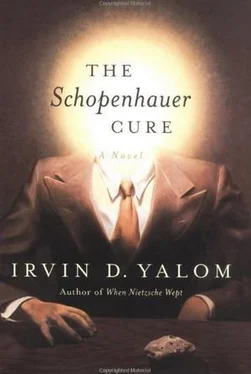Ирвин Ялом - The Schopenhauer Cure
Здесь есть возможность читать онлайн «Ирвин Ялом - The Schopenhauer Cure» весь текст электронной книги совершенно бесплатно (целиком полную версию без сокращений). В некоторых случаях можно слушать аудио, скачать через торрент в формате fb2 и присутствует краткое содержание. Жанр: Психология, на русском языке. Описание произведения, (предисловие) а так же отзывы посетителей доступны на портале библиотеки ЛибКат.
- Название:The Schopenhauer Cure
- Автор:
- Жанр:
- Год:неизвестен
- ISBN:нет данных
- Рейтинг книги:5 / 5. Голосов: 1
-
Избранное:Добавить в избранное
- Отзывы:
-
Ваша оценка:
- 100
- 1
- 2
- 3
- 4
- 5
The Schopenhauer Cure: краткое содержание, описание и аннотация
Предлагаем к чтению аннотацию, описание, краткое содержание или предисловие (зависит от того, что написал сам автор книги «The Schopenhauer Cure»). Если вы не нашли необходимую информацию о книге — напишите в комментариях, мы постараемся отыскать её.
The Schopenhauer Cure — читать онлайн бесплатно полную книгу (весь текст) целиком
Ниже представлен текст книги, разбитый по страницам. Система сохранения места последней прочитанной страницы, позволяет с удобством читать онлайн бесплатно книгу «The Schopenhauer Cure», без необходимости каждый раз заново искать на чём Вы остановились. Поставьте закладку, и сможете в любой момент перейти на страницу, на которой закончили чтение.
Интервал:
Закладка:
will make him so; he seldom attains his goal and, when
he does it is only to be disappointed: he is mostly
shipwrecked in the end, and comes into harbor with
masts and riggings gone. And then it is all one whether
he has been happy or miserable; for his life was never
anything more than a present moment, always
vanishing; and now it is over.
After a long silence Rebecca said, «That sends
shivers up my back.»
«I know what you mean,” said Bonnie.
«I know I`m sounding like an uptight English
professor,” said Pam, addressing the entire group, «but I
urge you, don`t be misled by rhetoric. That quote adds
nothing of substance to what Philip has been saying all
along; it only says it more persuasively. Schopenhauer was
a brilliant stylist and wrote the best prose of any
philosopher. Except for Nietzsche, of course—no one
wrote better than Nietzsche.»
«Philip, I want to respond to your comment about
our basic orientations,” said Julius. «I don`t believe we`re
as far apart as you think. I don`t disagree with much that
you and Schopenhauer have said about the tragedy of the
human condition. Where you go east and I go west is when
we turn to the question ofwhat to do about it. How shall we
live? How to face our mortality? How to live with the
knowledge that we are simply life–forms, thrown into an
indifferent universe, with no preordained purpose?
«As you know,” Julius continued, «though I`m more
interested in philosophy than most therapists, I`m no
expert. Yet, I`m aware of other bold thinkers who have not
flinched from these raw facts of life and who have arrived
at entirely different solutions than Schopenhauer. I`m
thinking particularly of Camus, Sartre, and Nietzsche, who
all advocate life engagement rather than Schopenhauer`s
pessimistic resignation. The one I know best is Nietzsche.
You know, when I first received my diagnosis and was in a
state of panic, I openedThus Spoke Zarathustra and was
both calmed and inspired—especially by his life–celebratory comment that we should live life in such a
manner that we`d say yes if we were offered the
opportunity to live our life again and again in precisely the
same manner.»
«How did that relieve you?» asked Philip.
«I looked at my life and felt that I had lived it right—
no regrets frominside though, of course, I hated theoutside
events that took my wife from me. It helped me decide how
I should live my remaining days: I should continue doing
exactly what had always offered me satisfaction and
meaning.»
«I didn`t know that about you and Nietzsche, Julius,”
said Pam. «It makes me feel even closer to you
becauseZarathustra, melodramatic as it is, remains one of
my absolutely favorite books. And I`ll tell you my favorite
quote from it. It`s when Zarathustra says, вЂWas that life?
Well, then, once again!` I love people who embrace life and
get turned off by those who shrink away from it—I`m
thinking of Vijay in India. Next ad I run in a personal
column maybe I`ll post that Nietzsche quote and the
Schopenhauer tombstone quote side–by–side and ask
respondents to choose between them. That would winnow
out the nay–sayers.
«I have another thought I want to share.» Pam turned
to face Philip. «I guess it`s obvious that after the last
meeting I thought about you a lot. I`m teaching a course on
biography, and in my reading last week I ran across an
amazing passage in Erik Erikson`s biography of Martin
Luther. It goes something like this:вЂLuther elevated his own
neurosis to that of a universal patient–hood and then tried
to solve for the world what he could not solve for himself.` I
believe that Schopenhauer, like Luther, seriously fell into
this error and that you`ve followed his lead.»
«Perhaps,” responded Philip in a conciliatory
fashion, «neurosis is a social construct, and we may need a
different kind of therapy and a different kind of philosophy
for different temperaments—one approach for those who
are replenished by closeness to others and another approach
for those who choose the life of the mind. Consider, for
example, the large numbers who are drawn to Buddhist
meditation retreats.»
«That remind me of something I`ve been meaning to
say to you, Philip,” said Bonnie. «I think your view of
Buddhism misses something. I`ve attended Buddhist
retreats where the focus has been directed outwards—on
loving kindness and connectivity—not on solitude. A good
Buddhist can be active, in the world, even politically
active—all in the service of loving others.»
«So it`s becoming clearer,” said Julius, «that your
selectivity error involves human relationships. To give
another example: you`ve cited the views about death or
solitude of several philosophers but never speak of what
these same philosophers—and I`m thinking of the Greek
philosophers—have said about the joys ofphilia, of
friendship. I remember one of my own supervisors quoting
me a passage from Epicurus saying that friendship was the
most important ingredient for a happy life and that eating
without a close friend was living the life of a lion or a wolf.
And Aristotle`s definition of a friend—one who promotes
the better and the sounder in the other—comes close to my
idea of the ideal therapist.»
«Philip,” Julius asked, «how is this all feeling today?
Are we laying too much on you at once?»
«I`m tempted to defend myself by pointing out that
not one of the great philosophers ever married, except
Montaigne, who remained so disinterested in his family
that he was unsure how many children he had. But, with
only one remaining meeting, what`s the point? It`s hard to
listen constructively when my entire course, everything I
plan to do as a counselor, is under attack.»
«Speaking for myself, that`s not true. There`s a great
deal you can contribute, much that youhave contributed to
the members here. Right?» Julius scanned the group.
After lots of strenuous head–nodding affirmation for
Philip, Julius continued: «But, if you`re to be a counselor,
youmust enter the social world. I want to remind you that
many, I would betmost, of those who will consult you in
your practice will need help in their interpersonal
relationships, and if you want to support yourself as a
therapist, youmust become an expert in these matters—
there`s no other way. Just take a look around the group:
everyone here entered because of conflicted relationships.
Pam came in because of problems with the men in her life,
Rebecca because of the way her looks influenced her
relations with others, Tony because of a mutually
destructive relationship with Lizzy and his frequent fights
with other men, and so on for everyone.»
Julius hesitated, then decided to include all the
members. «Gill entered because of marital conflict. Stuart
because his wife was threatening to leave him, Bonnie
because of loneliness and problems with her daughter and
ex–husband. You see what I mean, relationships cannot be
ignored. And, don`t forget, that`s the very reason I insisted
you enter the group before offering you supervision.»
«Perhaps there`s no hope for me. My slate of
relationships, past and present, is blank. Not with family,
not with friends, not with lovers. I treasure my solitude, but
Читать дальшеИнтервал:
Закладка:
Похожие книги на «The Schopenhauer Cure»
Представляем Вашему вниманию похожие книги на «The Schopenhauer Cure» списком для выбора. Мы отобрали схожую по названию и смыслу литературу в надежде предоставить читателям больше вариантов отыскать новые, интересные, ещё непрочитанные произведения.
Обсуждение, отзывы о книге «The Schopenhauer Cure» и просто собственные мнения читателей. Оставьте ваши комментарии, напишите, что Вы думаете о произведении, его смысле или главных героях. Укажите что конкретно понравилось, а что нет, и почему Вы так считаете.








![Ирвин Ялом - Проблема Спинозы [litres]](/books/396345/irvin-yalom-problema-spinozy-litres-thumb.webp)

